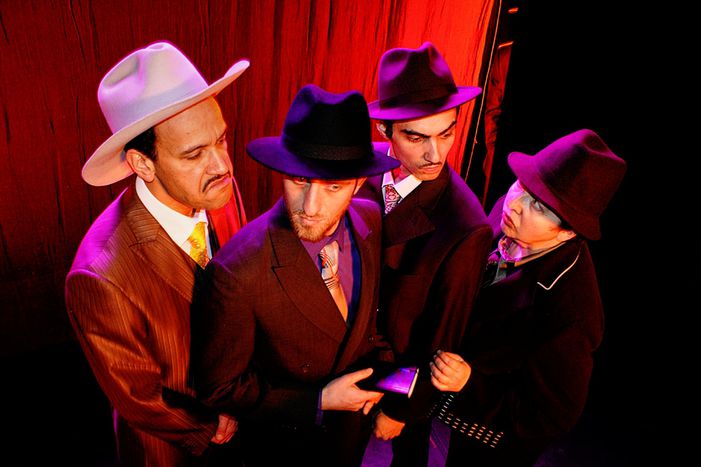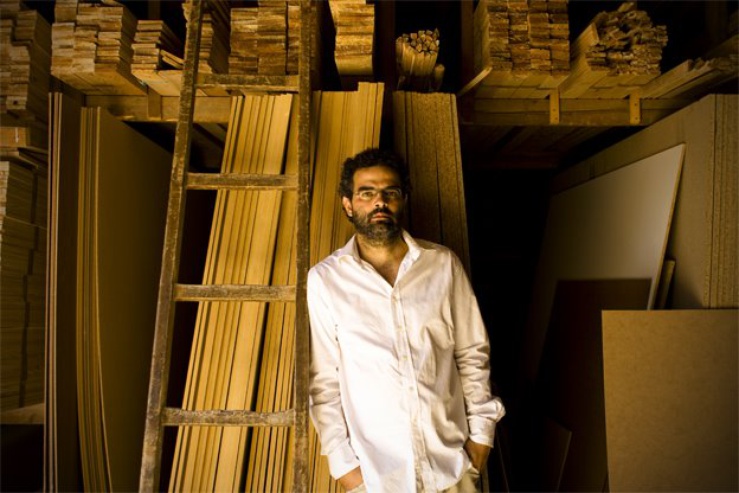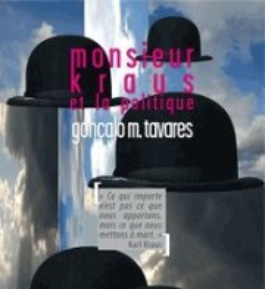
'Mister Kraus': Portuguese satire gets a Polish theatrical revival
Published on
Translation by:
HayleyPortuguese writer Gonçalo M. Tavares advises artists to be 'free to distance themselves from my texts if they feel the need to. From now on, this work belongs to them. It follows its own path.’ Polish stage director Violetta Wowczack is directing the theatre adaptation of his book, the charming (or not-so-charming, depending the viewer) Mister Kraus and politics in Paris
The Portuguese writer Gonçalo M. Tavares has only been writing since he was thirty-one years old but now at forty he has already made a name for himself in European literature. All of his books are about the same utopian place, O barrio, a neighbourhood populated by people who share their names with famous writers such as Mister Brecht, Valéry and even Calvino. Mister Kraus, protagonist of Tavares' book Monsieur Kraus et la politique, is the ideal journalist with his meticulous yet caustic style. When it comes to politics, Mister Kraus can only refer to it through his satirical columns. It is worth mentioning that the boss, his three advisors and the other characters that Tavares has invented are bound to be the source of a few forced laughs of despair.
Actors and dancers
The Portuguese author's work was directed by the Polish actress-turned-director Violetta Wowczak. Based in France since 1985, she founded the Wowczack stage company in 2005 with the actress Sylvie Borten, one of the advisors to the boss in the play. After the première at the Théâtre des Déchargeurs, Violetta explains that Tavares' book is a ‘happy encounter’ for her in 2009. A theatrical vision of the work suddenly came to her and she passed it on to the actors, demanding from them rather time-consuming work based on body movement. Onstage, it is easy to mistake these actors for dancers, despite the fact that none of them have ever been trained to dance!

The character of Mister Kraus himself is a tribute to the real-life Austrian author and pamphleteer, Karl Kraus, who died in anonymity in 1936 before being rediscovered after the second world war. Feared for his rather virulent satire, Kraus founded the review Die Fackel, which he would single-handedly edit for four decades. Political corruption, as well as the corruption of language - for which he blamed the press – and the denial of justice are among the many themes that would make his pen come alive and bring him many enemies.
Wild play
Violetta Wowczack already knew of Karl Kraus before reading Tavares' work. ‘Tavares made me read Kraus' more personal, and also challenging, texts. The more I saw of his work, the more I liked him. Onstage, the boss is, in the literal sense, a political animal of the worst kind. Eric Moscardo-Rabenja, who plays the boss – or rather, bosses – asked the actors to pretend they were animals, just for fun. Eric then starts imitating a pelican. Very quickly, everyone is given their own expressions, mimes and a certain way of moving about. The comedy in the film mostly revolves around the body language of these political clowns who dance, scowl and shoot at each other.
Even the media isn't spared
They are funny yet fierce. When it comes to moving up the hierarchical ladder by getting closer to the boss – and even seducing him - his three advisors can't help but suspect each other, and their dirty tricks would make even the loathsome courtesans of the king in Les Caractères (a satirical piece written by Jean de la Bruyère and edited for the first time in 1688) blush. The ‘court,’ which is being directed here, is a political cabinet of the modern kind. With ridiculous elements such as the boss wearing a tracksuit and hilarious scenes such as the mobile phone concert, the director's intentions are clear: we live through this pathetic political spectacle even today. Violetta Wowczack's goal is for her play to be timeless and universal, as Tavares' text does not take place in any particular time or place.
'We live through this pathetic political spectacle even today'
Despite the author being Portuguese, the director Polish and the acting troupe French, the text reminded Wowczack of certain political goings-on in her own country. Tavares' text and Wowczack's play have no borders. So it's out of the question for Harlan, the American actor who speaks in a rather peculiar French, to try and improve his accent. In the ‘barrio’ that Tavares has created, whether it be Mister Karl, Mister Valéry (September 2008) or Mister Calvino (September 2009), the characters are always stereotyped. It’s totally possible to find them in any period in history and in any country where the mass media is the main (and only?) source of information.
Ode to solitude
 The world of politics gets a thrashing, but that doesn’t mean that the world of media is spared. In this sense, Mister Kraus is an exemplary journalist. He is as worried for the stupidity of the written press as he is for the stupidity of his own boss. As well as managing to enter the lair of power, he also spends his time with the common people and, in one of the major scenes of the play, listens to their comments about a newspaper which explains that the results of a football match should be decided by popular vote – a sort of ‘Democracy for Dummies.’ Mister Kraus is an exemplary journalist and is therefore awfully lonely. For Violetta Wowczack, being a journalist is about having ‘the privilege of public speech’. The actor, the artist and the play are all part of this mission. The actors tell me, all in agreement, that they feel ‘vested in something in a play such as this one’. Except that, as Emmanuel Gil points out, ‘theatre wasn’t made to give out answers but to ask questions.'
The world of politics gets a thrashing, but that doesn’t mean that the world of media is spared. In this sense, Mister Kraus is an exemplary journalist. He is as worried for the stupidity of the written press as he is for the stupidity of his own boss. As well as managing to enter the lair of power, he also spends his time with the common people and, in one of the major scenes of the play, listens to their comments about a newspaper which explains that the results of a football match should be decided by popular vote – a sort of ‘Democracy for Dummies.’ Mister Kraus is an exemplary journalist and is therefore awfully lonely. For Violetta Wowczack, being a journalist is about having ‘the privilege of public speech’. The actor, the artist and the play are all part of this mission. The actors tell me, all in agreement, that they feel ‘vested in something in a play such as this one’. Except that, as Emmanuel Gil points out, ‘theatre wasn’t made to give out answers but to ask questions.'
Images: main 'Monsieur Kraus et la politique' courtesy of théâtre des Déchargeurs; Gonçalo M. Tavares © courtesy of the writer
Translated from «Monsieur Kraus et la politique» : satire portugaise à la sauce polonaise



